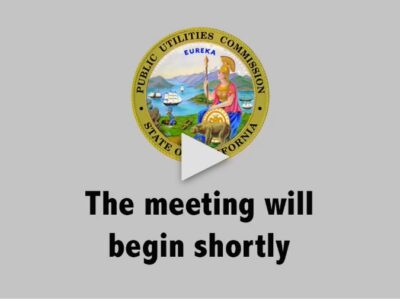Californians and the Environment: PPIC’s New Survey Results
 The Public Policy Institute of California this week released the results of its 12th annual “Californians and the Environment” survey. PPIC, a non-partisan think tank, always seems to be generating thought-provoking and cutting-edge scholarship focusing on the nation-state of California. Its latest environmental survey, based on recent polling of 2500 Californians, continues that tradition.
The Public Policy Institute of California this week released the results of its 12th annual “Californians and the Environment” survey. PPIC, a non-partisan think tank, always seems to be generating thought-provoking and cutting-edge scholarship focusing on the nation-state of California. Its latest environmental survey, based on recent polling of 2500 Californians, continues that tradition.
The new survey focuses on Californians’ views on four distinct, environment-related topics: the 2012 presidential election candidates; conventional air pollution; state climate change issues; and California energy policy. A lot of fascinating and sometimes surprising nuggets can be culled from the survey results reported by PPIC. Here are some highlights on each of the above topics:
Californians’ Views of the Presidential Candidates
- Perhaps unsurprisingly for this blue state, Californians prefer Obama to Romney in the November election, 51-40%. Those surveyed trust President Obama over Romney to address the nation’s energy and climate change issues by a more lopsided 54-33% margin.
- Fully 72% of Californians consider global warming and energy issues to be very (30%) or somewhat (42%) important issues in determining their choice for President this fall.
Climate Change & AB 32
- A solid majority of Californians (78%) believe that global temperatures have increased over the past century, and 60% think the effects of global warming have already begun manifesting themselves.
- A similarly large percentage of Californians (71%) continue to support AB 32, the state’s landmark Global Warming Solutions Act. But whereas support for that law was bipartisan when Republican Governor Schwarzenegger signed AB 32 into law in 2006, Californians’ views of the law have become far more partisan since then: 84% of state Democrats currently support AB 32, as do 65% of Independents, while Republicans oppose the law by a 48-44% margin.
- 42% of those surveyed believe that government-sponsored action to curb the state’s aggregate greenhouse gas emissions will create jobs in California, 25% believe AB 32 will be no net effect on jobs, and 25% believe state climate change measures will result in fewer jobs.
- Surprisingly, overwhelming majorities of Californians–across party lines–favor each of the following strategies to address global warming: increased energy efficiency standards (77%); requiring industrial and commercial facilities to reduce GHG emissions (82%); encouraging local governments to change land use and transportation policies to encourage less driving (77%); mandating automakers to further reduce GHG emissions from new automobiles (78%); and requiring fuel providers to reduce the carbon intensity of transportation fuels by 2020 (79%).
- Remarkably, fully 57% of Californians say they’ve heard nothing to date about the state’s cap-and-trade program. After hearing a brief description of the program, a bare majority (53%) expresses support, while 36% of those surveyed oppose cap-and-trade. Notably, respondents who say they’ve heard a lot about California’s cap-and-trade program are those most likely to oppose it: 62% against vs. 35% in favor.
- Although permit auctions of allocations under the cap-and-trade program are expected to raise $1 billion in the program’s first year, two-thirds of Californians have little or no confidence that state government officials will spend those revenues wisely.
Energy Policy
- 63% of Californians remain opposed to building more nuclear power plants in the state, a figure that spiked after the 2011 nuclear disaster in Japan and remains high in 2012.
- A strong majority (78%) of Californians support the state’s renewable energy portfolio standard, which requires that one-third of California’s electricity be generated from renewable energy sources by the year 2020. But that support drops to 44% if implementation of that policy means higher electricity bills for those surveyed.
- A majority of Californians (54%) have heard of hydraulic fracking–more than have heard of the state’s cap-and-trade program. Of those who are aware of fracking, 42% support the technology while 46% oppose it.
Air Pollution
- While two-thirds of Californians believe that air pollution remains a significant problem, the percentages vary considerably among regions of the state. Respondents in Los Angeles, the Central Valley and the Inland Empire are far more likely to consider regional air pollution a big problem than are residents of the Bay Area, San Diego or Orange County. And Latinos (37%) and African-Americans (33%) are much more likely than Asians (20%) and whites (18%) to view air pollution as a major concern.
- In the good news/bad news department: solid majorities of Californians continue to back tougher emissions standards on new passenger vehicles (65%), diesel-engine vehicles (71%) and stationary sources of air pollution (70%); a smaller majority (54%) supports more stringent air emission standards on California agriculture. But these numbers actually reflect the lowest level of public support for these types of air pollution programs since PPIC began asking the question in 2005.







Reader Comments